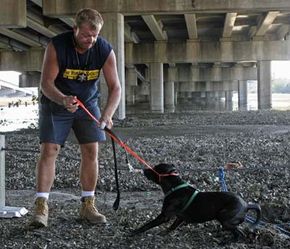Becoming an Animal Detective
One of the most recognized examples of people working to solve animal-related crimes is in New York City, where 14 uniformed and plain-clothed Humane Law Enforcement (HLE) agents operate. These agents were made famous on Animal Planet's "Animal Precinct," and maybe their work has inspired others to join their ranks.
There isn't one defined path to becoming an animal detective. Some people study criminal justice or animal sciences in college, while others capitalize on their prior law enforcement skills to make a career change. Any experience in law enforcement, in a veterinary clinic or at an animal rescue shelter puts you at an advantage for a career in animal protection.
Advertisement
Becoming an animal detective or law enforcement officer usually requires a degree or related experience, in addition to training, background checks, and certification (such as National Animal Control Association certification). For example, the state of California requires U.S. citizenship, fingerprints and training in animal care and the state's humane laws, as well as training by the Commission on Peace Officer Standards and Training. Some officers in California also complete training to make arrests [source: State Humane Association of California].
Every state has its own criteria and courses for those wanting to become animal detectives. Individual states offer programs specific to their laws and focus on public health and safety, law enforcement skills, intervention skills, and written and verbal communication. In Wisconsin, humane officer training courses cover topics like the role of animal investigator, search and seizure rules, evaluation of cruelty, crime scene procedure and collection of evidence, interview and interrogation, crisis intervention, civil liability and Wisconsin law [source: Wisconsin Department of Agriculture, Trade and Consumer Protection]. Additionally, formal animal cruelty investigations training, available in locations around the country, are almost always required for the job.
As with any training, there are associated costs. These costs vary by state and typically include course tuition, and testing and certification fees.
For more information about current legislation and the work being done to prevent animal cruelty, visit the related resources below.
Related HowStuffWorks Articles
More Great Links
Sources
- "All About McGruff the Crime Dog." National Crime Prevention Council. http://www.ncpc.org/mcgruff
- American Humane Association. http://www.americanhumane.org/
- American Society for the Prevention of Cruelty to Animals. http://www.aspca.org/
- "Animal Cruelty." Pet-Abuse.com. http://www.pet-abuse.com/pages/animal_cruelty.php
- "Animal Welfare Act as Amended (7 USC, 2131-2156)." The Animal Welfare Information Center. U.S. Department of Agriculture. http://www.nal.usda.gov/awic/legislat/awa.htm
- "Crime Prevention -- McGruff the Crime Dog (1979 - Present)." Ad Council. http://www.adcouncil.org/default.aspx?id=136
- "First Strike: The Connection Between Animal Cruelty and Human Violence." The Humane Society of the United States. http://www.hsus.org/hsus_field/first_strike_the_connection_ between_animal_cruelty_and_human_violence/
- "How can I become an animal cruelty investigator?" Oregon Humane Society. http://www.oregonhumane.org/Investigator.htm
- "How was the ASPCA started?" Animal Precinct. Animal Planet. http://animal.discovery.com/fansites/animalprecinct/history.html
- "Humane Officer Training Course Information." Wisconsin Department of Agriculture, Trade and Consumer Protection. http://datcp.state.wi.us/ah/agriculture/animals/welfare/humane-officer/index.jsp
- "Humane Officers." State Humane Association of California. http://www.californiastatehumane.org/humaneofficers.htm
- Humane Society of the United States. http://www.hsus.org/
- "Investigations and Rescue." San Diego Humane Society and SPCA. http://www.sdhumane.org/site/PageServer?pagename=don_InvestigationsRescue
- National Animal Control Association. June 30, 2008. http://www.nacanet.org/
- Pahl, Michelle. "U.S. 'Animal Detectives' Fight Crime in Forensics Lab." National Geographic. April 2, 2003. http://news.nationalgeographic.com/news/pf/91582696.html
- Peters, Sharon. "Crime scene team exposes animal cruelty." USA Today. Updated Oct. 9, 2007. http://www.usatoday.com/tech/science/2007-10-09-veterinary-forensics_N.htm
- Robins, Sandy. "When your pet goes missing, call a detective." MSNBC. Aug. 30, 2006. http://www.msnbc.msn.com/id/12136519/
- "State Animal Anti-Cruelty Law Provisions." The Humane Society of the United States. 2007. http://www.hsus.org/web-files/PDF/state_cruelty_chart.pdf
- U.S. Fish and Wildlife Service Forensics Lab. U.S. Department of the Interior. http://www.lab.fws.gov/index.php
- Watts, Robyn. "The Best Job (Humane Law Enforcement)." Petfinder.com. ASPCA. 2001. http://www.petfinder.com/journal/index.cgi?article=839
- "Ways to Help Animals As a Career." Just For Kids. American Humane Association. http://www.americanhumane.org/kids/career.htm
- "What is CITES?" Convention on International Trade in Endangered Species of Wild Fauna and Flora (CITES). http://www.cites.org/
- Wisch, Rebecca F. "Overview of State Cruelty Laws." Animal Legal & Historical Center. Michigan State University College of Law. 2005. http://www.animallaw.info/articles/ovusstatecrueltylaws.htm
